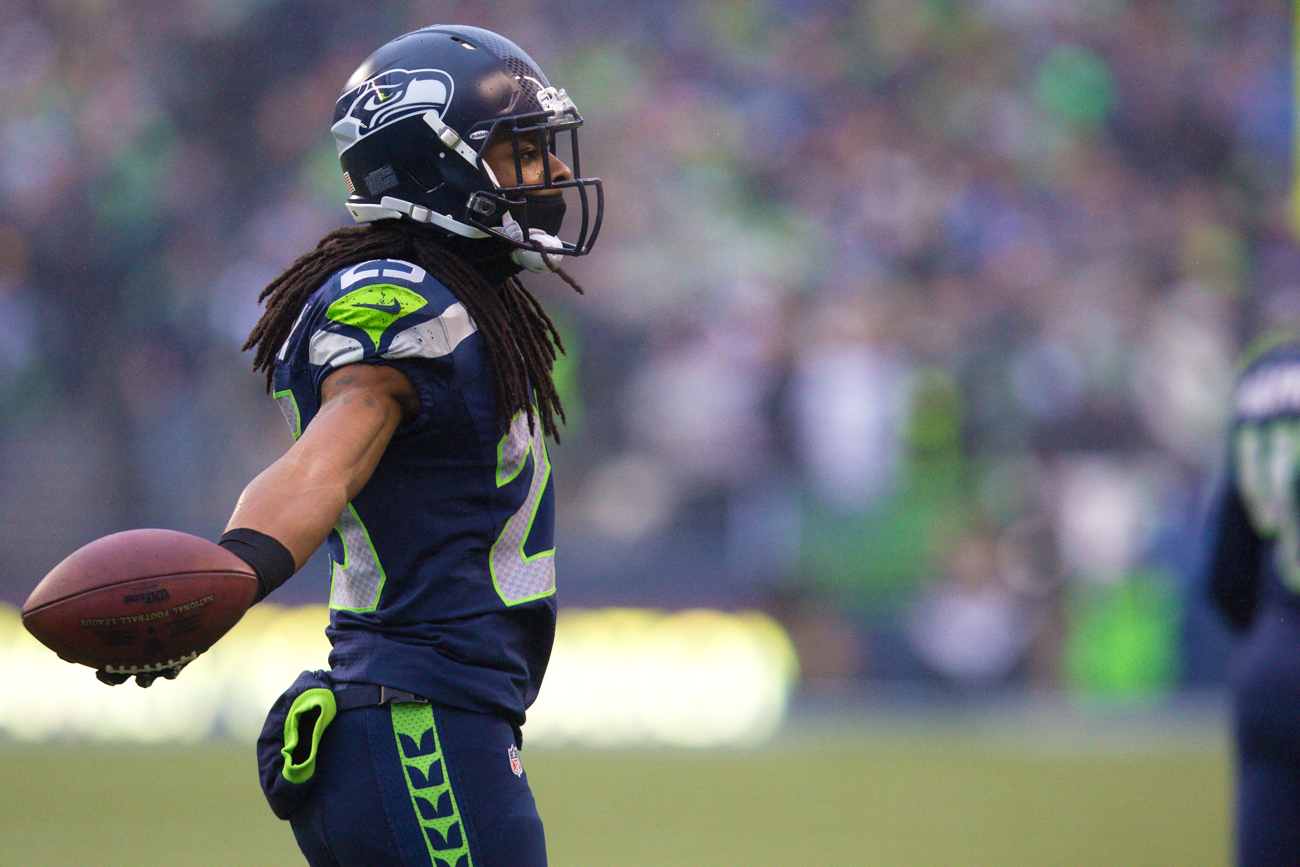By some accounts, Sunday’s Super Bowl will pit the Denver Broncos against the Seattle Thugs. Critics, from non-Seahawks fans down to politicians, see the Hawks as a blood-sport hybrid of football team and organized crime. Detractors accuse Seattle of harboring criminals in the secondary while pols such as Sen. John McCain—who lost his own Super Bowl after picking a backup whose only move was to her extreme right—apparently feels the whole roster should be jailed. Even coach Pete Carroll, McCain noted, is himself “one step ahead of the sheriff.”
Much of this is reaction to cornerback Richard Sherman’s memorable postgame boasting last week, making him The Face, or at least The Mouth, of the Seahawks before the media in New York this week. His “I’m the best” braggadocio was exaggerated as thuggery. He’s since been held up as an example of the NFL’s “culture of violence,” leaving some fans wondering if he and other Seahawks were actual criminals.
The NFL has those, of course. In a league of men who crush bones and brains for a living, their offenses range from drunken misdemeanors to serious felonies such as the murder charge against New England’s Aaron Hernandez this season and the murder/suicide by Kansas City’s Jovan Belcher in 2012. As in the latter instance, when Belcher killed his girlfriend, domestic violence is a frequent charge against pro athletes.
So do the supposedly bad-boy Seahawks, a 63-man roster (with 10 on the reserve list) have some kind of violent culture problem? In their two-season run-up to the Super Bowl, the Hawks’ rap sheet comprises eight misdemeanor and three felony arrests. Among them are four gross-misdemeanor drunk-driving charges—the latest for Spencer Ware, a rookie running back on the injured reserve list, arrested this month after driving erratically on I-5 and registering a .12 on a Breathalyzer test (.08 is the drunk threshold). Receiver Percy Harvin was arrested in June for a DUI related to marijuana, then found not to be under the influence, and released. Josh Portis, a third-string quarterback arrested in May, blew a .09; he was later waived by the franchise. Star running back Marshawn Lynch was arrested in July 2012 near Oakland with a .10 blood-alcohol reading. He has accused officers of changing their story, but apologized for drinking too much.
In the other cases, John Moffitt—a reserve guard who was traded to the Broncos in the middle of the season, and who has since made waves for resigning from football entirely—was twice arrested for misdemeanor criminal trespass at Bellevue Square, where he was once seen peeing outside a bar and later fled the cops. Leroy Hill, a veteran linebacker who left the team this season, was arrested last year on two domestic-violence charges, one a felony, after allegedly assaulting his girlfriend. Tharold Simon, a currently inactive rookie cornerback, was arrested in April in Eunice, La., for a misdemeanor and a felony—resisting arrest. (An officer said a defiant Simon told him, “I own Eunice!”) He was drafted four days later by the Seahawks; the charges were dropped in December. Finally, lineman Jarriel King was arrested on felony rape charges in 2012; he allegedly sexually assaulted a South Carolina woman after a night of drinking and drugs. The Seahawks quickly dropped him; court records show prosecutors closed the case in October for lack of evidence.
Also, ESPN this season ranked Seattle first among NFL teams in player suspensions for use of performance-enhancing or other drugs. Seven players have been cited since Carroll took over three seasons back: Moffitt, linebacker Bruce Irving, cornerbacks Walter Thurmond and Brandon Browner, and now-ex-players Allen Barbre, Winston Guy Jr., and Sherman, who last season successfully appealed his suspension.
Not a proud record—but does it add up to thuggery? Numerically, if arrests were points, the Hawks wouldn’t even make the playoffs. An accounting by The
San Diego Union-Tribune ranks the team 13th in busts since 2000. They had 20 as of last summer—a number that doesn’t include additional arrests I found, but that “officially” ties the team with New Orleans. The Minnesota Vikings, with 40 busts, lead the league—and finished last in their division this season.
Today’s Hawks clearly are no outlaw team like Al Davis’s Oakland Raiders of the ’70s and ’80s—or, for that matter, like Ken Behring’s Seahawks of the ’90s. Under their former owner, this was a franchise of criminal misfits on the field and off—even a general manager was twice tried for murder. The goofy Behring, who once moved the team overnight to Los Angeles and was forced back by injunctions, was accused by one of his secretaries of requiring women to sign release forms, promising not to sue him, before he’d have sex with them.
Oh, and that other thing: His Hawks never went to the Super Bowl.
randerson@seattleweekly.com








